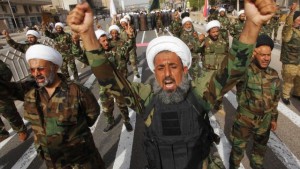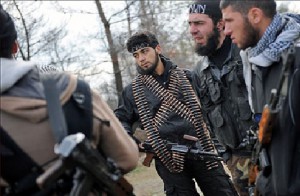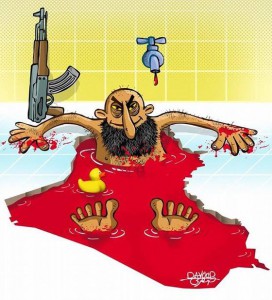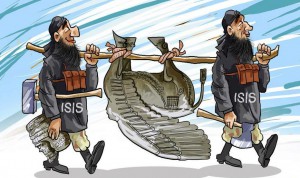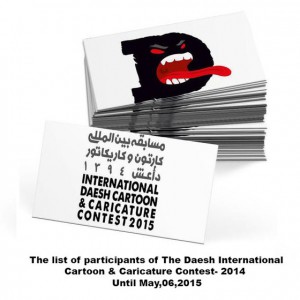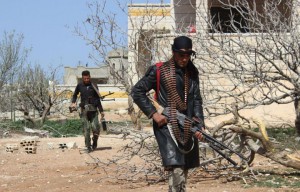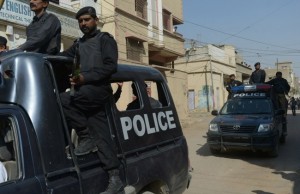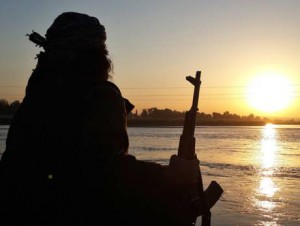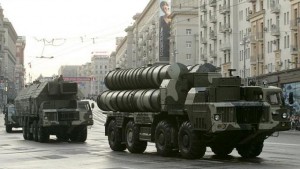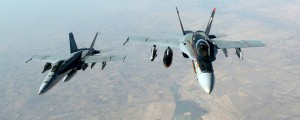Army chiefs of staff of Arab countries have drafted a protocol for a new joint force to intervene in Middle East hotspots on missions ranging from fighting militants to Iran-backed groups — despite lingering disagreements on some details, including where to base the force’s headquarters.
The plan, drafted at a gathering Sunday in Cairo, describes where and how the force would be put into action. Membership is “voluntary,” the draft says, and if only three of the members sign up, it’s enough to put the plan into action. A decision to intervene would be based on a request from a member state “facing threats.”
The idea of an Arab joint force has already been tested in the ongoing Saudi-led coalition’s airstrikes against Shiite rebels in Yemen. But observers say that in cases like Libya, consensus on a military intervention would be difficult since different Arab countries support rival parties in the North African nation.
Defense ministers of member states would run the force, with two-thirds of votes required to pass decisions. Military plans on engagements would be up to the member states’ military chiefs.
However, there was dissension over the force being headquartered in Cairo, the home of the Arab League. Qatar and Algeria objected to the location, said officials who attended the gathering.
US Defense Secretary Ash Carter endorsed the Arab joint force plan and State Department officials said that the United States was waiting to see the exact structure and operational mandate of the joint force.
Iraqi Shi’ite militia claim leadership of Anbar campaign against Islamic State
Iraq’s Shi’ite paramilitaries announced on Tuesday they had taken charge of the campaign to drive Islamic State from the western province of Anbar, giving the operation an openly sectarian codename that could infuriate its Sunni population.
The Iraqi government is scrambling to reverse its biggest military setback in nearly a year, the fall of Ramadi, capital of Anbar province west of Baghdad. Prime Minister Haidar Abadi has vowed to recapture it within days.
Ramadi’s fall a week ago was swiftly followed by the fall of the city of Palmyra in Syria, the two biggest gains by Islamic State fighters since the United States began targeting them with air strikes in both Iraq and Syria last year.
Islamic State controls swathes of territory in both countries, where it has proclaimed a caliphate to rule over all Muslims according to strict mediaeval precepts.
The simultaneous advances over the past week at opposite ends of the group’s territory have raised doubts about the U.S. strategy to bomb the militants from the air but leave fighting on the ground to local Iraqi and Syrian forces.
In Iraq, the regular military’s failure to hold Ramadi has forced the government to send Iran-backed Shi’ite paramilitaries to help retake the city. Washington is worried this could enrage residents in the overwhelmingly Sunni province and push them into the arms of Islamic State.
A spokesman for the Shi’ite militias, known as Hashid Shaabi, said the codename for the new operation would be “Labaik ya Hussein”, a slogan in honour of a grandson of the Prophet Mohammed killed in the 7th Century battle that spawned the schism between Shi’ite and Sunni Muslims.
“The Labaik Ya Hussein operation is led by the Hashid Shaabi in cooperation and coordination with the armed forces there,” Assadi said at a televised news conference. “We believe that liberating Ramadi will not take long.”
ALIENATION
The militia fighters have performed better on the battlefield than Iraq’s own army, but their presence risks alienating the Sunni residents of the area, especially if they emphasise sectarian aims.
Washington hopes Iraq’s Shi’ite-led government can win the support of Sunni tribal fighters, the tactic U.S. Marines used in Anbar to defeat Islamic State’s al Qaeda predecessors during the deadliest phase of the 2003-2011 U.S. occupation of Iraq.
Any increase in sectarian rage plays into the hands of Islamic State, which promotes itself as the only force capable of protecting Sunnis from Shi’ite aggression, considers all Shi’ites to be heretics who must repent or die, and seeks to provoke a wider sectarian battle to hasten the apocalypse.
The Baghdad government has succeeded in persuading some Sunni tribal leaders to accept help from the Shi’ite fighters, but mistrust runs deep after years of sectarian war in which atrocities were committed on both sides.
Iraqi government forces and the Shi’ite militia have been pushing back towards Ramadi since Saturday in the Euphrates river valley west of Baghdad.
President Barack Obama, who won office in 2008 on a campaign pledge to withdraw U.S. troops from Iraq, has ruled out sending ground forces to fight against Islamic State.
Instead, Iran has filled the vacuum, providing aid and leadership to the Hashid Shaabi Shi’ite militia forces.
The commander of the Quds Force of Iran’s Revolutionary Guards, the main Iranian force backing its allies abroad, mocked Washington for doing too little to aid Baghdad.
“Obama has not done a damn thing so far to confront Daesh. Doesn’t that show that there is no will in America to confront it?” Qassem Soleimani, said, using an Arabic acronym for Islamic State.
“How is it that America claims to be protecting the Iraqi government, when a few kilometres away in Ramadi killings and war crimes are taking place and they are doing nothing?” said the Iranian general, who was spotted in recent weeks on the battlefield helping to lead the Iraqi Shi’ite militia.
Soleimani’s remarks came a day after U.S. Defense Secretary Ash Carter infuriated Baghdad by saying the Iraqi army had abandoned Ramadi because it lacked “the will to fight”, remarks Iraqi Prime Minister Abadi said showed Carter was misinformed.
In a move of apparent damage control after Carter’s comments, Vice President Joe Biden phoned Abadi on Monday to reassure him that Washington still supported Baghdad.
Although Washington backs the government in Iraq, it is opposed to Islamic State’s other main enemy, the Syrian government of President Bashar al-Assad, a position which makes forging a united alliance against the militants difficult.
Assad, an Iranian ally, is fighting a range of mainly Sunni insurgent groups in a four-year-old civil war that has killed more than a quarter of a million people and made eight million homeless. His government has lost ground in recent months to Islamic State and other Sunni groups, including a local branch of al Qaeda and groups that have Western and Arab support.
On Monday the Syrian air force pounded Palmyra, some 240 km (150 miles) northeast of the capital, in a bid to dislodge Islamic State fighters who seized it last week. The city of 50,000 people is also home to some of the world’s oldest and best-preserved ancient Roman ruins.
Islamic State boasts that its fighters carry out mass killings in towns and cities that they seize, and dynamite and bulldoze ancient monuments they consider evidence of paganism.
The Britain-based Syrian Observatory for Human Rights monitoring group says the fighters killed more than 200 people, including children, after capturing the city.
Syria’s government-run satellite television stations were interrupted on Tuesday by what Damascus said was interference by its foreign enemies.
ISIS gangs formed ‘to kidnap western fighters for $150,000-a-head bounty’
Iran launches anti-Islamic State cartoon competition
Iran has launched an anti-Islamic State (IS) cartoon competition, inviting submissions from all over the world to mock the terrorist organisation and the crimes that it commits.
The organisers of the campaign said that selected works would be displayed at cultural centres across Tehran and the winner would be announced on May 31.
According to the state-run IRNA news agency, artists were briefed by Iran’s House of Cartoon to focus on “the crimes committed by the Islamic State”.
Executive secretary of the contest Mohammad Habibi said that 280 works had been selected from 800 submissions, including entries from over 40 countries including Brazil, Australia and Indonesia.
Habibi said that some foreign cartoonists were attending the contest, but that they have been forced to travel under pseudonyms due to security concerns.
“Nowadays, everyone around the world knows about the parasite by the name of IS and what crimes they have committed against humanity and arts and culture. Artists now have the duty to raise public awareness about this group by participating in such events.”
One of the contestants, artist Massoud Shoajaei Tabatabaii said that the contest was being held “to reveal the true nature of Daesh.”
“Daesh tries to associate itself with Islam but in essence it has no idea about Islam.”
Funded by the local government in Tehran, the House of Cartoon last held a competition on the theme of Holocaust denial following the depiction of the Prophet Muhammed (pbuh) in the French magazine Charlie Hebdo earlier this year.
Fighting between Islamic State and Nusra Front militants on outskirts of Arsal
A series of tit-for-tat abductions was sparked between the Islamic State of Iraq and the Levant (ISIL) the al-Qaida-affiliate al-Nusra Front a day after clashes erupted between the two groups on the outskirts of the northeastern border town of Arsal.
Voice of Lebanon radio (93.3) reported on Tuesday that Syrian national Hussam Trad, an ISIL member, went missing in the outskirts of Arsal.
Security sources estimated that Trad was kidnapped in retaliation to the abduction of Ahmed Seifeddine on Monday.
Seifeddine, is also known as al-Silis.
Fighting broke out shortly after his abduction, where he was taken to the mountainous outskirts of Arsal.
The two groups have been clashing in the town’s outskirts for months now.
Despite ideological similarities, al-Nusra and the IS are opposed and in conflict with each other in parts of Syria, particularly in the north.
In August 2014, the two groups however joined forces and engaged in a deadly battle with the Lebanese army in and around Arsal. They eventually withdrew from the town, abducting dozens of troops and policemen.
Four hostages have been executed.
Pakistani security forces kill 7 talibans in Karachi
A Pakistani military official says raids by security forces in the port city of Karachi have killed seven militants.
Brig. Gen. Mohammad Khurram told reporters Tuesday that the two overnight raids came after reports that militants from main Pakistani Taliban group planned to attack a security forces headquarters near the airport.
Khurram says that in the first raid, three militants were trapped in a building and killed themselves by detonating explosive vests.
He adds that in the second raid, security forces killed three militants while a fourth blew himself up.
After the Pakistani army began military operations in their tribal sanctuaries, many Taliban militants began hiding in urban areas.
For a Islamic State fighter, a paid honeymoon in caliphate’s heart
The honeymoon was a brief moment for love, away from the front lines of Syria’s war. In the capital of Daesh’s self-proclaimed “caliphate,” Syrian fighter Abu Bilal Al Homsi was united with his Tunisian bride for the first time after months chatting online. They married, then passed the days dining on grilled meats in Raqqa’s restaurants, strolling along the Euphrates River and eating ice cream.
It was all made possible by the marriage bonus he received from Daesh: $1,500 (Dh5,509) for him and his wife to get started on a new home, a family — and a honeymoon.
“It has everything one would want for a wedding,” Al Homsi said of Raqqa — a riverside provincial capital that in the 18 months since Daesh took control has seen terrorists beheading opponents and stoning accused adulteresses in its main square. Gunmen at checkpoints in the city scrutinise passers-by for signs of anything they see as a violation of Sharia, as slight as a hint of hair gel or an improperly kept beard. In the homes of some of the Daesh commanders in the city are women and girls from the Yazidi religious sect, abducted in Iraq and now kept as sex slaves.
“It is not just fighting,” said Al Homsi, who uses a nom de guerre. “There are institutions. There are civilians [that Daesh] is in charge of, and wide territories. It must help the immigrants marry. These are the components of a state and it must look after its subjects.” Al Homsi spoke in a series of interviews over internet calls, giving a rare look into the personal life of an Daesh terrorist.
Helping fighters marry is a key priority. Aside from the normal stipend they receive, foreign fighters get $500 when they marry to help them put together their new household. Aymam Al Tamimi, an expert on insurgent groups, said that when Daesh took Iraq’s second largest city Mosul last summer, one of the first things it did was set up an Islamic court — not just to pass sentences under their strict version of Sharia but also “to give official Daesh approval of marriages.”
The 28-year-old Al Homsi got a particularly large bonus because his marriage, which took place in April, brought in a useful new recruit: His wife, who goes by the nom de guerre of Umm Bilal, is a doctor and speaks four languages. He said she will be of service to the caliphate.
The AP has spoken with Al Homsi repeatedly over the past three years, when he started as an activist covering the fighting in his home city of Homs in central Syria. An IT specialist before the civil war broke out, Al Homsi reported prolifically on social media about the two-year siege of the city by Al Assad’s forces and often briefed reporters.
He was always an ultraconservative Islamist, and he told AP he had supported Daesh as early as 2013. Being caught in the punishing siege of Homs turned him from an activist to a fighter. He was among the last die-hards who remained holed up in a Homs neighbourhood blasted constantly by government troops. When the siege ended in a May 2014 truce, Al Homsi emerged hardened and has since been a member of Daesh.
It was from his social media activity that he met his wife. From Tunisia, she admired his comments and briefings online.
“She has been an old follower of mine, during the siege,” Al Homsi said with a slight smile.
After communicating with her through internet calls and online, Al Homsi found out that her brother had joined Daesh and was in the eastern Syrian city of Deir Al Zour.
As is customary for marriage, he went to ask her brother for her hand in marriage, he said.
‘Duty of state’
The 24-year-old bride-to-be travelled through Algeria to Turkey, and from there to Raqqa with a group of other women joining Daesh. There, they were housed in a guest house for women, which is also used as the headquarters for the Daesh female police corps known as the Khansa Squad.
“It is a luxury place, with a garden, A/C, nice furniture, like any apartment in Europe” so that immigrants don’t feel estranged, said Abu Ebrahim Al Raqqawi, an anti-Daesh media activist. Like others in his media collective, he uses a nickname for his security and doesn’t specify his whereabouts.
In April, Al Homsi made the hazardous 250-kilometre journey from Homs to Raqqa to join her, bringing a recommendation from his local commander to prove his membership in Daesh.
It was rare marriage of a Syrian male fighter — an “ansari” as the group calls them — with a foreign migrant, or a “muhajira.”
Usually, foreign women marry foreign fighters in Daesh. Al Homsi recalled the case of a French militant who was supposed to marry a French woman who came to join the group. He was killed in battle but he asked in his will that if that happened, his fiancee should marry his Swiss friend, Al Homsi said. She agreed.
During the few days of their honeymoon, Al Homsi and his bride enjoyed Raqqa’s relative tranquillity, riverside promenades and restaurants, staying in an apartment Al Homsi borrowed from a friend.
Then the couple travelled back to the countryside around Homs, where Daesh terrorists are holding ground against Al Assad forces and rival rebel groups.
There, Al Homsi used the money from his grant to prepare a home for his new bride — and his four kittens, which he held up proudly in the video chat conversation with the AP. The couple is now expecting a new baby and hoping for a new cash injection with the childbirth, as the group can pay up to $400 as a bonus for each child.
For now the group provides him with a stipend of $50 a month and a similar amount for his wife, which he said are mainly for “entertainment.”
Everything else is paid for: He gets an allowance for his uniform and clothes, some household cleaning supplies, and monthly food baskets worth $65.
It is the duty of the state, Al Homsi said, to care for the fighter’s family while he is away battling to expand the caliphate. Soon after speaking to the AP, Al Homsi was back on the battlefield, among the terrorists who took over the ancient city of Palmyra earlier this month.
“The fighter is on the front,” Al Homsi said. “How will he bring food to the house?”
Pro-government forces retake Yemeni city
Pro-government fighters have retaken a southern Yemeni city from Shiite rebels in their first significant advance since a Saudi-led coalition began striking the rebels in late March.
Officials and witnesses in the southwestern city of Dhale said Tuesday that pro-government fighters also captured the command center of the 33rd Armored Brigade.
The brigade, which once controlled the city, is one of the country’s largest army units. It is loyal to ousted President Ali Abdullah Saleh, who is allied with the rebels, known as Houthis. Officials, speaking on condition of anonymity because they are not authorized to brief reporters, say the fighters seized large weapons and ammunition caches.
The fighters in Dhale are allied with exiled President Abed Rabbo Mansour Hadi, but also want an independent southern state.
Russia, Iran talks on S-300 missiles end in ‘success’
Moscow and Tehran have concluded talks on the delivery of Russian S-300 missiles to Iran which should take place “quite” soon, Deputy Foreign Minister Hossein Amir-Abdollahian said Monday.
“The negotiations on the subject have ended in success. I estimate that the S-300 delivery will take place in quite a short time,” Amir-Abdollahian said in Moscow.
“It will be done at the soonest opportunity possible,” he added after meeting his Russian counterpart Mikhail Bogdanov.
The Russian foreign ministry has not confirmed the announcement, but noted the “importance of maintaining a regular Russian-Iranian dialogue” in a statement Monday.
Tehran has previously said the missiles would be delivered by the end of the year.
The sale of the missiles was blocked in 2010 by former president Dmitri Medvedev, but in April President Vladimir Putin gave the go ahead after Tehran struck a landmark deal in Lausanne with the West over its nuclear programme.
Moscow said progress in nuclear talks between Iran and world powers meant there was no longer a need for it to prohibit exporting the surface-to-air missiles to Tehran.
The sale sparked strong condemnation from Israel and triggered concern in Washington.
EU military plan includes possible attack against Islamic State in Libya
Wikileaks released two classified EU documents, outlining the planned military intervention against boats travelling from Libya to Italy.
The more significant of the two documents was written by the combined military defence chiefs of the EU member states. The plan was formally approved by representatives from all 28 countries on 18 May 2015.
One of the most glaring revelations is that one of the documents acknowledges that “the political End State [of the military intervention] is not clearly defined” and recommends that the European Commission issue further guidance.
The documents lay out a military operation against cross-Mediterranean refugee transport networks and infrastructure. It details plans to conduct military operations to destroy boats used for transporting migrants and refugees in Libyan territory, preventing them from reaching Europe.
The EU member states’ military chiefs advice is that there is a need to “[draw] on the full range of surveillance, intelligence and information capabilities available to MS [member states] and Partners, and supported by Brussels (inter alia EEAS [European External Action Service] Single Intelligence Analysis Capacity – SIAC)”.
The plan also acknowledges the possibility of EU military use of force against groups such as ISIL “within the Libyan sovereign area”, “the threat to the force should be acknowledged, especially during activities such as boarding and when operating on land or in proximity to an unsecured coastline, or during interaction with non-seaworthy vessels. The potential presence of hostile forces, extremists or terrorists such as Da’esh [ISIL] should also be taken into consideration”.
The documents mark a departure from previous EU military strategy in its overt targeting of civilian infrastructure in Libya.
Numerous EU countries, including Belgium, Bulgaria, Denmark, France, Greece, Italy, the Netherlands, Romania, Spain, Sweden and the United Kingdom participated in NATO-led air strikes on Libya in 2011.
Human rights organisations have called on the EU not to put the lives of refugees and migrants at risk. The plan acknowledges that the EU risks negative publicity “should loss of life be attributed, correctly or incorrectly, to action or inaction by the EU force”.
To manage this reputational risk, the documents recommend “an EU information strategy from the outset” in order to “facilitate expectation management”.
They also acknowledge the “need to calibrate military activity” particularly within Libyan waters or ashore “in order to avoid destabilising the political process by causing collateral damage, disrupting legitimate economic activity or creating a perception of having chosen sides”.
Boats transporting people from Libya are the main means for refugees fleeing conflict in Syria, Eritrea, Afghanistan and the Horn of Africa to reach safety in Europe. Since the destruction of the Libyan government in 2011 there has been a sharp increase in the numbers of refugees travelling to Europe from Libya.
In 2014 more than 170,000 people are estimated to have crossed the Mediterranean from Libya. In 2014, this made up 60 per cent of the entire irregular migration into the EU.

